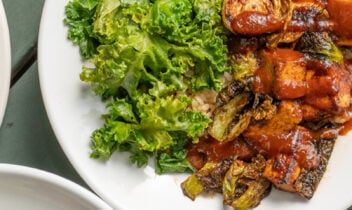TheBUZZ: What you eat … even HOW you eat it … affects your kids?
WHAT THEY’RE SAYING
Families with parents/guardians who enjoy and eat fruits and vegetables on a regular basis are more likely to have children who meet their daily fruit and vegetable recommendation.
WHAT WE KNOW
Ever heard that “obesity runs in families”? In some ways, this statement is true. Children who are raised in homes with poor dietary habits and a couch-potato lifestyle are much more likely to be overweight or obese as adolescents. What’s even more frightening is that if a child is obese at age 10-14, studies show that s/he has a high chance of remaining at a dangerously heavy weight through adulthood!
How do these habits form? Parents, guardians and peers! It’s well known that school-aged children mainly learn by observing others. The greatest impact on a healthy lifestyle, therefore, is having healthy foods available and easily accessible in the home and having these healthy foods being enjoyed by mothers and other members in the household on a regular basis!
HOW DO WE KNOW THIS?
A review of 24 studies in the Journal of Epidemiology and Community Health, found that when comparing a parent’s diet with his/her child’s, the more fat and calories the parent consumed, the more the child consumed as well.¹ Another review published in the British Journal of Nutrition showed that a positive parental role model may be a better method for improving a child’s diet than attempts at dietary control.²
A very interesting study, published recently in the journal Obesity, suggests that parents should smile while eating something they want their children to eat. The study showed photos of people happily eating a child’s favorite food made them want it even more, while a photo of a person looking disgusted by that same food tended to make the children want it less. If a child disliked a certain food, seeing someone with a pleasant expression eating it made the child more open to trying that food.³
OUR ADVICE
When it comes to fruits and veggies, actions can sometimes speak louder than words! While getting your children to eat healthfully is not always easy, remember to be a role model and be positive about fruits and veggies! One of the best things you can do is to make eating fruits and vegetables part of your daily balanced diet. Then … help your kids learn about nutrition. Learning at an early age is important and can be fun. And one of the best ways to learn … is by doing.
Getting kids involved in meal preparation enhances their interest and increases the chance they’ll want to finish the final product (even if it’s healthy!). Our kid-friendly recipes will stir up some fun while teaching your children science, math, culture, and healthy eating habits.
And for you? Sign up for our newsletter and get monthly recipes, nutrition facts, and other tools to keep your family happy and healthy.
¹ Wang, Y., M. Beydoun, Y. Liu, et al. “Do Children and Their Parents Eat a Similar Diet? Resemblance in Child and Parental Dietary Intake: Systemic Review and Meta-Analysis.” Journal of Epidemiology and Community Health (2011); 65(2):177-89.
² Scaglioni, S., M. Salvioni, C. Galimberti. “Influence of Parental Attitudes in the Development of Children Eating Behaviour.” British Journal of Nutrition (2008); 99: S22-5.
³ Barthomeuf, L., S. Droit-Volet, S. Rousset. “Differences in the Desire to Eat in Children and Adults in the Presence of an Obese Eater.” Obesity (2011): doi:10.1038/oby.2011.26.
|


